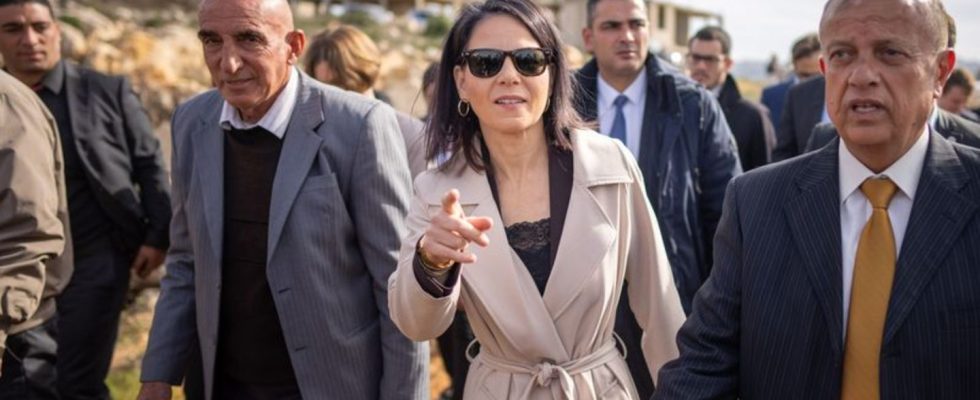War in the Middle East
Baerbock in Egypt: Focus on the humanitarian situation in Gaza
Foreign Minister Annalena Baerbock spoke to residents displaced by settler violence in the West Bank. photo
© Michael Kappeler/dpa
Right at the start of her Middle East trip, the Foreign Minister called on Israel to do more to provide for the needy Palestinians in Gaza. The issue is likely to be the focus again in Egypt.
Against the backdrop of the dramatic humanitarian situation in the Gaza Strip, Federal Foreign Minister Annalena Baerbock is visiting Egypt this Tuesday. The Green politician wants to meet Foreign Minister Samih Schukri in the capital Cairo this morning. The conversation is likely to focus primarily on the situation of the Palestinians in the Gaza Strip, efforts to release the Islamist Hamas hostages and possible paths towards a two-state solution after the end of the Gaza war.
The war was triggered by the worst massacre in Israel’s history, carried out by terrorists from Hamas and other extremist Palestinian organizations on October 7th in Israel near the border with the Gaza Strip. On the Israeli side, 1,200 people were killed. According to the Hamas-controlled health authority, the number of Palestinians killed in the Gaza Strip has risen to more than 23,000 since the start of the war, with almost 59,000 people injured.
Baerbock: Border crossings bottleneck for aid deliveries
At the start of her multi-day Middle East trip, Baerbock had already called on Israel on Sunday evening to make the processing of aid deliveries to the Gaza Strip more practical in view of the suffering of the Palestinian civilian population in the Gaza Strip. People need food, clean water and medical care. Germany has therefore tripled its humanitarian aid since the start of the war to over 200 million euros and is “ready to continue to support wherever we can”. The relief supplies would then have to arrive.
An important beginning is that in addition to the Rafah border crossing between Egypt and Gaza, Israel has also opened the Kerem Shalom crossing for aid deliveries, she said after talks with Israeli President Izchak Herzog and the new Foreign Minister Israel Katz in Jerusalem. “But the way these border crossings currently work, they are a bottleneck. It cannot stay that way.” More ways to provide humanitarian aid would have to be found. So far, relief supplies have been delivered to people primarily via the Rafah border crossing in the south of the Gaza Strip.
At the end of last year, the Israeli military urged residents of the hotly contested town of Khan Yunis in the south of the coastal region to seek safety in Rafah. Thousands of Palestinians are reportedly sheltering in tents there. The Gaza director of the UN Palestinian relief agency UNRWA, Thomas White, had already criticized back then that Rafah was “bursting at the seams”.
The head of the UN emergency agency OCHA, Martin Griffiths, said at the end of last week: “Gaza has become a place of death and despair.” The heavily bombed area had become “uninhabitable” and there was a threat of famine. The past 12 weeks of the Gaza war have been traumatic, especially for the children.
Talks on Hezbollah planned in Lebanon
Baerbock wanted to travel on to Lebanon later on Tuesday. Talks were planned in the capital Beirut with acting Foreign Minister Abdallah Bou Habib and the commander of the armed forces, General Joseph Aoun. Since the beginning of the Gaza war, the Iran-backed Shiite militia Hezbollah has been firing more projectiles into Israel from Lebanon. Israel usually responds to this with attacks on Hezbollah positions in Lebanon.
On Monday, Wissam al-Tauil, a Hezbollah unit commander, was killed in a suspected drone strike in southern Lebanon. Since the beginning of the Gaza war, there has been growing concern that the conflict is developing into a regional conflagration.

